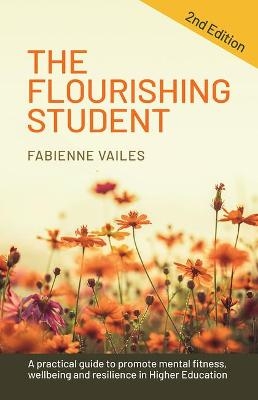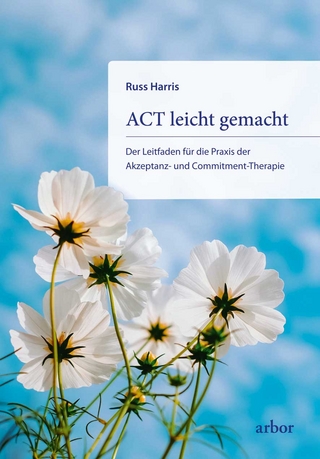
The Flourishing Student – 2nd edition
Practical Inspiration Publishing (Verlag)
978-1-78860-333-1 (ISBN)
The REAL University Challenge: Helping students to become flourishing life-long learners.
As a tutor you want to help students to flourish not only academically but in all aspects of their university lives: mentally, emotionally, physically, socially and spiritually. But with students reporting stress and anxiety at an all-time high, and academic staff under more pressure than ever before, you could use some help.
In this new, post-pandemic edition of the classic guide, Fabienne Vailes reveals how you can help your students develop a ‘tool box’ of well-being techniques that will support them through university and beyond, and ensure your own well-being at the same time. She finishes with thoughts on how universities can implement systemic changes that support flourishing at an institutional, not just at an individual, level.
Fabienne Vailes is an expert on emotional and mental well-being within the education sector. She is on a mission to change the face of education – embedding well-being into the curriculum to create an environment where both students and staff flourish and become empowered lifelong learners to succeed both academically and in the workplace.
Fabienne Vailes is an expert on emotional and mental well-being within the education sector. As an educational expert with almost 25 years’ experience in the sector, Fabienne is on a mission to change the face of education – embedding well-being into the curriculum to create an environment where both students and staff flourish and develop the mental agility and resilience to succeed both academically and in the workplace. Fabienne has extensive experience of teaching across all age groups (from nursery to primary, secondary, FE and HE as well as adult learners). She is currently Language Director at the University of Bristol, specializing in Intercultural Competence and Communication. She has an unusually wide appreciation of the issues facing learners (and teachers) at all levels.
Table of Contents
Introduction
Welcome to The Flourishing Student
What is the aim of this book?
Why a book on mental health?
Why a book on HE in particular?
What is this book about?
Who is this book for?
How to use this book
PART I – GAINING UNDERSTANDING AND CLARITY
Chapter 1 – Setting the scene – The current state of student mental health in the UK’s Higher Education
The general picture
What about student health?
Why are students reporting getting increasingly stressed?
The issues with our language uses of the words ‘mental health’
Mental health – a definition
The confusing impact of multiple negative modifiers
Why so much negativity?
The language we use matters
The danger of labelling oneself and others
The difference between behaviour and identity
Becoming aware of the stigma around mental health
The rise of mental health awareness
Wellbeing and the rise of the concept of embedding wellbeing in the curriculum
Chapter 2 – Time for clarity and understanding – a real need for mental health literacy
The different stages of mental health and why it matters
What’s the difference between a disorder and a normal stress response?
Clarification – for whom are the interventions in this book suggested?
The stress response – what happens in our body
The stress response – an issue in the 21st century?
Why stress is good for us
The stress vulnerability model
The stress bucket
Factors of influence on mental health – biological (genetics) and environmental (epigenetics), cultural and social
The good news – neuroplasticity – our capacity for change
What does it mean for the HE sector?
Important final points to consider
PART II – THE IMPLICATIONS FOR EDUCATION
Chapter 3 – Time for a new model?
Emotional, cognitive, physical, social, spiritual health – always kept separate
What if they are all a ‘continuum’ – Corey Keyes’s model as an exemplar
The mental health continuum: from languishing to flourishing in life
What is a flourishing student versus a languishing individual?
WHO’s definition of health and link with the new concept of ‘flourishing student’
Chapter 4 – A new model based on students’ stories
The flourishing student model
The university as a garden
The environment
The roots
The stem
Life and academic skills
The head of the flower
Emotional health
Cognitive health
Physical health
Social health
Spiritual health
Openness
Curiosity
Flexibility
Resilience
Language
How we communicate
PART III – THE TUTOR’S OWN TOOLBOX
Chapter 5 – It all starts with you – the flourishing tutor
How is your mental/physical/social/emotional/spiritual health doing?
Your role – not in isolation but part of a whole
How to create a community instead of an ‘institution’ which fosters resilience, diversity and student voices
Chapter 6 – Your skills
Listening skills and empathy
Time
Confidentiality
Know your limits – what to say, not to say
Boundaries, boundaries, boundaries – do you know where to refer your students?
Guiding rather than leading
Can you recognize what is going on with your tutees?
Chapter 7 – How to bridge the student’s skill gaps
Conscious incompetence versus unconscious competence
How to bridge the gap between knowledge
Letting go of our own labels/bias – how do you define students’ success?
The 5 elements that foster wellbeing
Chapter 8 What next?
Understanding
Awareness
A toolbox
The need for a systemic approach
Mental Health charter and whole university approach
A potential model? Appreciative Inquiry
From one colleague to another
Sharing with others
References
Index
| Erscheinungsdatum | 14.03.2022 |
|---|---|
| Vorwort | Professor Jenny Hill |
| Verlagsort | Tadley |
| Sprache | englisch |
| Maße | 140 x 216 mm |
| Gewicht | 342 g |
| Themenwelt | Sachbuch/Ratgeber ► Gesundheit / Leben / Psychologie ► Psychologie |
| Sozialwissenschaften ► Pädagogik ► Didaktik | |
| ISBN-10 | 1-78860-333-8 / 1788603338 |
| ISBN-13 | 978-1-78860-333-1 / 9781788603331 |
| Zustand | Neuware |
| Haben Sie eine Frage zum Produkt? |
aus dem Bereich


